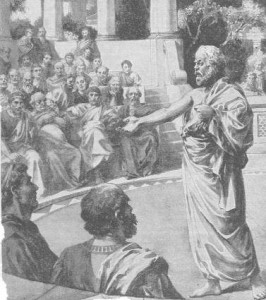I happened to pick up my hero, Kurt Vonnegut, on CBC Radio’s The Current this morning. He’s 83, and his combination of profound pessimism and dogged goodness continues to knock me out. He’s so appalled by all the dastardly things humans have done that he figures it’s about time we were done.
“Done?”
“Over! We’ve had our chance; we screwed it up. The dinosaurs are finished and I suspect they did a lot less to screw up the planet than we have.” He imagines a great voice from “the bottom of the Grand Canyon or someplace, saying ‘It is finished. These beings did not like it here. They were not happy.’” He advocates a “War on Petroleum” instead of the failed war on drugs (or war on terrorism, bien sûr), and ridicules the wealthy and powerful for their residence in the 51st state (“the state of Denial”). In one of his characteristic KV Junior flights of bitter fun, he offers that driving a car is perhaps the happiest thing humans have ever found to do, and now we’ll keep on driving blissfully until there’s no fossil fuel left and the system falls for those who follow us. “And what do I care? I’ll be dead! What does a CEO care, ‘just fuel up my jet today ‘cause I’m going to be dead anyway.’”
I saw Mr. Vonnegut give a public talk years ago in Stratford, Ontario. We were all so delighted to laugh with him, so ready to rumble. He got talking about smoking, his status as an “old fart with his Pall Malls”, and laughed at the warnings on packages. “These warnings are ridiculous. ’Smoking can kill you,’ they say. So what? That’s the whole point?” Strangest thing I ever heard in a theatre: the audience rolled instantly into a good laugh, and halfway through it collectively realized the nihilistic point he’d just made. In midstream, the laughter morphed into a sudden groan. “Ha, ha-ooohh.” When Anna Maria asked him today about his smoking, he said he was planning to sue Pall Mall. “Their packages promise they’re going to kill me. But I’ve been chain-smoking unfiltered Pall Malls since I was 12 and I’m still alive! They owe me.”
He was on the radio, of course, to comment on the war in Iraq, to compare it with his Second World War experience as an American soldier in Germany, and the imprisonment that became so well-known with his classic novel Slaughterhouse Five. He has sworn off novels, but has a new book out called A Man Without a Country. As pessimistic as he so volubly is, he continues to stand and to write and fight for what he has called the greatest thing we can have, “a little human decency”. This dogged use of his despair is terrifyingly good, painfully inspiring.
“You’re awfully pessimistic,” the interviewer says with some surprise.
“That’s what my wife says. Imagine what my marriage is like!”
“If you were to speak on behalf of your generation to young people today, what would your message be?” I’m sure Ms. Tremonti expected some warm and emphatic clichés, but I didn’t. Without fail, he breaks my heart with his sadness and courage.
“I apologize.” There was a pause. “And love one another, what the hell.”
“Thank you for talking to us, Kurt Vonnegut.”
“Go jump in the lake!” He chuckled and coughed. What a voice we will lose when he is gone.

